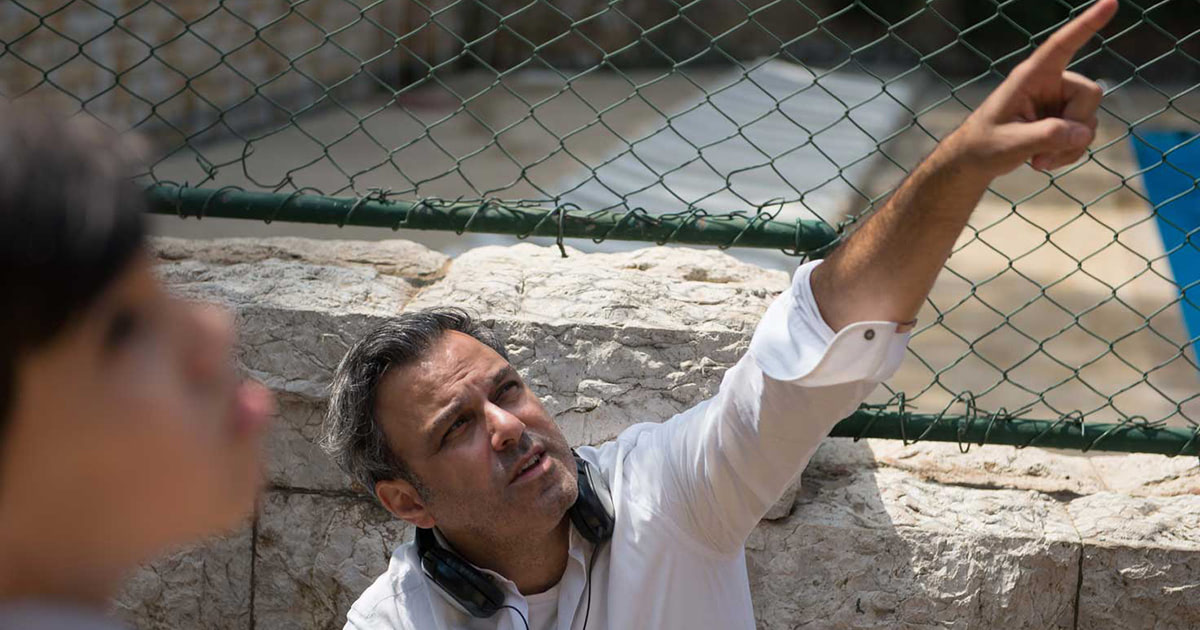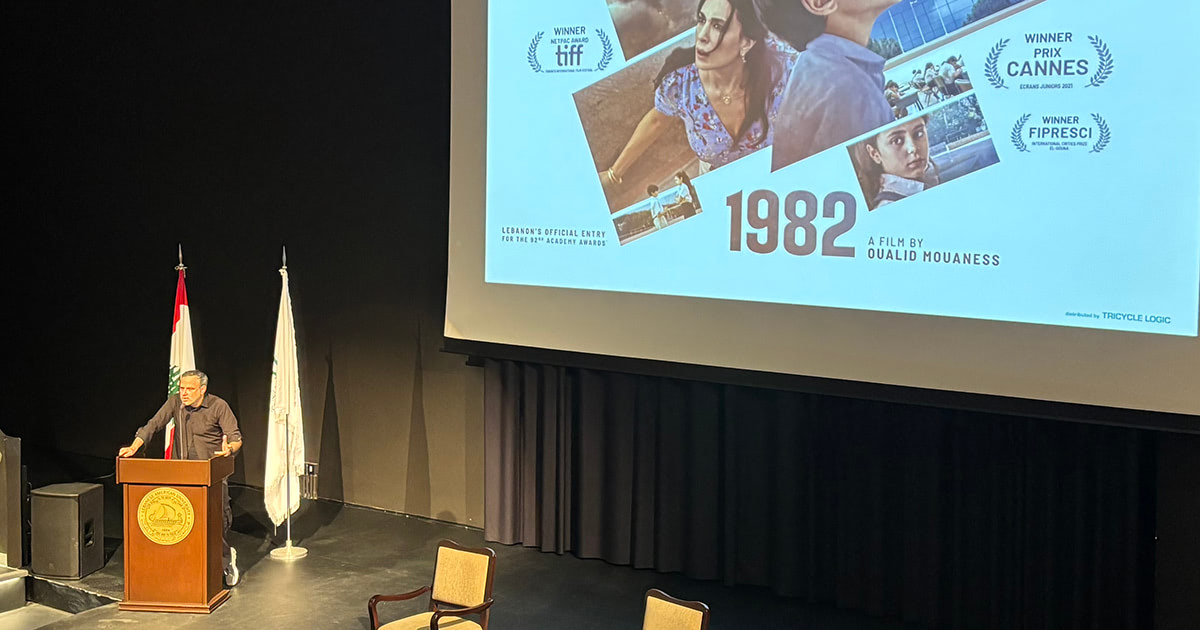Alumnus and Filmmaker Oualid Mouaness Hits “Replay” at LAU
The award-winning filmmaker returned to the stage of his youth for a screening of his directorial debut, 1982, and an inspiring discussion with LAU students.
At its premiere at the Toronto International Film Festival in 2019, alumnus Oualid Mouaness’ (BA ’94) directorial debut, 1982, received the NETPAC Award. In that same year, it won the FIPRESCI International Critics Prize at the El-Gouna Film Festival in Egypt, and was selected to represent Lebanon for Best International Feature Film at the 92nd Academy Awards.
1982 went on to win the Prix Cannes Écrans Juniors 2021 at the Cannes Film Festival’s youth sidebar Cannes Cinéphiles. Additionally, it won the UNICEF Prize 2021 in Switzerland. Acclaimed for its poignant portrayal of the country during a turbulent time in its history, it has since garnered multiple awards at film festivals in France, China, Qatar, and the US.
On April 23, coming full circle, the Lebanese award-winning director, writer, and producer, returned to his alma mater for a screening of his film at the Gulbenkian Amphitheater, LAU Beirut campus, where he had rehearsed and performed in plays as a Communication Arts student.
The screening was followed by a discussion of 1982 and filmmaking, moderated by Chairperson of the Department of English and Creative Arts at the School of Arts and Sciences Dany Badran, during which Mouaness shared insights into his career and creative process with the students.
Inspired by Mouaness’ memories of the Israeli invasion in 1982, the story unfolds on that one fateful day in the lives of 11-year-old Wissam, his friend Majid, and their classmates. Featuring a cross-section of characters—the teachers, the bus driver, and Majid’s mother—this “slice of life,” as he called it, “ended up representing the construct and divisions of the country.”
In this interview, Mouaness reveals the significance of bringing this film to the students and what he hoped they would take away from the discussion.
How does it feel to return to LAU to screen your film after all these years?
It’s heartwarming, yet strange. Walking through these hallways brings back so many memories. There’s a part of me that wishes things were the same as when I was here, but of course, they’ve changed. And that’s natural. It still feels like home, though. I’m so grateful to be here again, sharing the film with the students. It feels like a culmination of my journey, from my first days at LAU to now having my work recognized globally.
What I experienced as a student here was special. My memories of LAU are filled with warmth, intellectual challenge, and an inspiring group of teachers. I am still in touch with most of my classmates, and the friendships we built during the Communication Arts program are incredibly strong. We worked together closely, supporting each other’s growth. I’m not sure how things are structured now, but I hope students today are still able to form those kinds of bonds and learn from each other.
What was the driving force behind the story of 1982?
The story is deeply rooted in Lebanon’s crises, but I wanted to approach it through a lens of love and humanity. I aimed to tell a story that reflects the emotional depth of the Lebanese people, something that the world doesn’t often see. We’re often portrayed in the media through stereotypes that don’t capture who we are. In Hollywood, depictions of the Middle East and Lebanon are foreign and inaccurate. 1982 shows us in a way that’s authentic and relatable, and I think that’s what surprised people. It was important for me to represent Lebanon in a manner that felt true to us—emotional, human, imperfect, and caring for one another. This film was about a very charged moment in Lebanon’s history, but I chose to approach it with humanity rather than anger. I think that’s what has made it resonate with so many people.
What did you hope the students would take away from the screening and discussion?
I want students to see that it’s possible to create something that speaks to your culture, your identity, and your world. 1982 is a film made by someone like them, someone who came from here and built a career in the global film industry. The key is not to shy away from challenges and not to take the easy route. There is no easy route. As artists, we often face difficult decisions. We must be brave, humble, and sometimes go against the grain to say something meaningful.
It is important to note that good work is undeniable work, and it does not go unnoticed. Coupled with a strong work ethic, discipline and tenacity, it goes a long way. I’ve had the privilege to work alongside some of the most seminal artists and filmmakers of the last 25 years, and I began my path here, at LAU (then BUC), with many long hours and sleepless nights.
Looking ahead, do you think Lebanon’s history of war should continue to be explored in film?
While I’m working on other projects that don’t focus on war, I don’t think it’s possible to fully separate ourselves from our past. The Lebanese Civil War is part of our identity, and it shaped us in ways we can’t ignore. That said, my film isn’t just about the war—it’s about us as people, as a society. The war serves as a backdrop, but the story is about love, family, and survival. I think it’s important to continue telling these stories. Many facets and stories from Lebanon are waiting to be explored. Each story dictates how it’s told, but we can never forget our history. If we do, we risk repeating it.
As a filmmaker, do you consider yourself a cultural ambassador for Lebanon?
I do. I’m one of many. As filmmakers and artists, we all have the responsibility to represent our culture in what is becoming a more globalized media landscape. I consider myself a messenger from Lebanon to the world. I feel privileged to be able to tell stories that reflect who we are—our complexities, our resilience, our contradictions, our heritage, and our beauty as a culture. And if I can do that through my work, I’m fulfilling that responsibility. I’m proud to be able to share my country’s stories with the world.
Can your experience serve as a lesson to the new generation of filmmakers?
Absolutely. When I was younger, the world felt so distant, almost unreachable. What I am doing now seems unattainable. But now I realize it’s not as far away as we think. You just have to put in the work, be patient, and stay focused. I had great mentors at LAU who gave me the intellectual tools to succeed. And when I entered the industry, those tools helped me tremendously. I hope my trajectory inspires students to realize that anything is possible if you’re committed and willing to work hard. The industry is challenging, but there are countless opportunities if you stay determined.
This interview has been edited and condensed for the sake of clarity.

